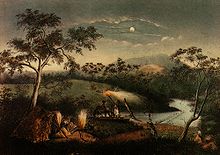Terra nullius is Latin term meaning ‘land belonging to no one’. Although this term was not initially used to justify the British colonisation of Australia, it later became central to the legal fiction upon which non-Indigenous sovereignty over Australia was based.

1864 from Souvenir Views of Melbourne and Victorian Scenery, Melbourne, 1865. Held in the La Trobe Collection, State Library of V
Land, as we have learned throughout this subject, is central to Aboriginal identity, well being and economic development. It is the source of life, law and religion. The right to land has been an issue of much concern for Indigenous Australians since the time of colonisation and the dispossession of ancestral lands. This week we explore the nature of Indigenous rights to land under the Native Title Act and the issue of heritage protection.
Here is a quote to consider:
| “
|
“Aboriginal people were dispossessed of their land parcel by parcel, to make way for expanding settlement. Their dispossession underwrote the development of a nation and the acts and events by which this dispossession in legal theory was carried into practical effect constitute the darkest aspect of the history of this nation” (Mabo (No.2) per Deane and Gaudron JJ, p109, quoted in Human Rights and Equal Opportunity Commission, 1998, 3).
|
”
|
In light of what you have learnt this semester, what do you think dispossession meant for Indigenous people?
On setting sail for what is now know as Australia, Captain Cook (who was Lieutenant Cook at the time) was directed to take possession of the continent, or parts thereof, with the ‘consent of the natives’ if he found the land to be inhabited. Cook’s journals, like those of the later members of the First Fleet in 1788, clearly records the sighting of a number of Indigenous inhabitants. Cook nevertheless claimed Aboriginal Australia on behalf of the British Crown without seeking any agreement from the inhabitants.
It was not until 1889 that the Privy Council in London retrospectively drew on the doctrine of terra nullius in seeking to clarify the legal basis of the British claim to sovereignty over the Australian continent. Terra nullius was the now discredited international doctrine of law which stated that territory inhabited by people who do not have, according to European standards, a recognised social or political system was considered land belonging to no-one.
Key Idea
Terra nullius is Latin term meaning ‘land belonging to no one’. Although this term was not initially used to justify the British colonisation of Australia, it later became central to the legal fiction upon which non-Indigenous sovereignty over Australia was based.
Land, as we have learned throughout this subject, is central to Aboriginal identity, well being and economic development. It is the source of life, law and religion. The right to land has been an issue of much concern for Indigenous Australians since the time of colonisation and the dispossession of ancestral lands. This week we explore the nature of Indigenous rights to land under the Native Title Act and the issue of heritage protection.
Reflection
Here is a quote to consider:
In light of what you have learnt this semester, what do you think dispossession meant for Indigenous people?
On setting sail for what is now know as Australia, Captain Cook (who was Lieutenant Cook at the time) was directed to take possession of the continent, or parts thereof, with the ‘consent of the natives’ if he found the land to be inhabited. Cook’s journals, like those of the later members of the First Fleet in 1788, clearly records the sighting of a number of Indigenous inhabitants. Cook nevertheless claimed Aboriginal Australia on behalf of the British Crown without seeking any agreement from the inhabitants.
It was not until 1889 that the Privy Council in London retrospectively drew on the doctrine of terra nullius in seeking to clarify the legal basis of the British claim to sovereignty over the Australian continent. Terra nullius was the now discredited international doctrine of law which stated that territory inhabited by people who do not have, according to European standards, a recognised social or political system was considered land belonging to no-one.
Content is available under the
Creative Commons Attribution Share Alike License.
Privacy Policy | Authors